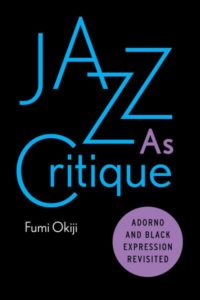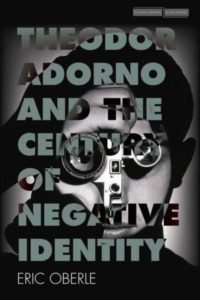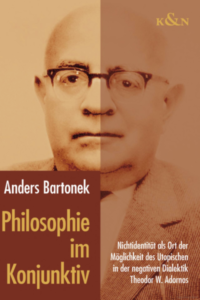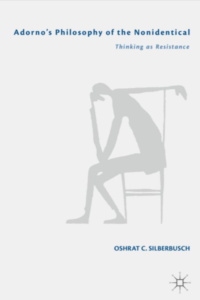



A growing bibliography compiled by participants in the seminar:
Bartonek, Anders. Philosophie im Konjunktiv. Nichtidentität als Ort der Möglichkeit des Utopischen in der negativen Dialektik Theodor W. Adornos. Königshausen & Neumann, 2010.
Bartonek, Anders. “Vad har reggae gemensamt med Adorno?” Modern Filosofi (2017) no 2, p. 16-17.
Ferrarese, Estelle, Lea Fink, Agnès Grivaux, Sarah Carlotta Hechler, Leonie
Hunter, Henrike Kohpeiß, Frederico Lyra de Carvalho, Frank Müller, Salima
Naït Ahmed, Alain-Patrick Olivier, Éliette Pinel, Alexandra Richter, Lea
Schlude, Frank Schumann, Jean Tain. Special issue in French and German on “Politique de la non-identité / Politik der Nichtidentität.” Trajectoires, hors série n°4 | 2020.
Gandesha, Samir. “The Use and Abuse of ‘Identity’: A Fanonian Critique” (3 Sept. 2019). Public lecture available on YouTube.
Halle, Randall. Queer Social Philosophy: Critical Readings from Kant to Adorno. University of Illinois Press, 2004.
Izenberg, Gerald. Identity: The Necessity of a Modern Idea. University of Pennsylvania Press, 2016.
Kreis, Guido. “»Nichtidentität« als Reflexionskategorie: Zum systematischen Zentrum der Negativen Dialektik,” in Marc Nicolas Sommer and Mario Schärli, eds., Das Ärgernis der Philosophie: Metaphysik in Adornos »Negativer Dialektik«. Mohr Siebeck, 2019. pp. 13–48.
Leeb, Claudia. “Laughing at the Other: Toward an Understanding of the Alt-Right with Adorno.” In Amirhosein Khandizaji, ed., Reading Adorno: The Endless Road. Palgrave Macmillan, 2019. pp. 75–100.
Marasco, Robyn. The Highway of Despair Critical Theory After Hegel. Columbia University Press, 2017.
Marasco, Robyn. “There’s a Fascist in the Family: Critical Theory and Antiauthoritarianism.” South Atlantic Quarterly (2018) 117 (4): 791–813.
Oberle, Eric. “Jazz, the Wound: Negative Identity, Culture, and the Problem of Weak Subjectivity in Theodor Adorno’s Twentieth Century.” Modern Intellectual History, Volume 13, Issue 2, August 2016, pp. 357–386.
Oberle, Eric. Theodor Adorno and the Century of Negative Identity. Stanford University Press, 2018. [Open access excerpts from the introduction and chapter 6 here]
Okiji, Fumi. Jazz as Critique: Adorno and Black Expression Revisited. Stanford University Press, 2018. [Open access excerpts from the introduction, chapter 1, chapter 3 here]
Philippou, Eleni. “Chapter 4: Ondaatje’s Anil’s Ghost and the Non-Identical” in Speaking Politically: Adorno and Postcolonial Fiction. Routledge, 2021.
Richter, Gerhard. “A Portrait of Non-Identity.” Monatshefte , Spring, 2002, Vol. 94, No. 1, Rereading Adorno (Spring, 2002), pp. 1–9.
Silberbusch, Oshrat C. Adorno’s Philosophy of the Nonidentical: Thinking as Resistance. Palgrave Macmillan, 2018.
Simpson, Sid. “Nietzsche, irrationalism, and the cruel irony of Adorno and Horkheimer’s political quietude.” Contemporary Political Theory (2020).
Sinnerbrink, Robert. “Enlightenment, domination and non-identity: Adorno’s negative dialectics,” in Understanding Hegelianism. Acumen, 2007.
Stoelzer, Marcel. “Adorno, Non-identity, Sexuality,” ch. 9 of Negativity and Revolution: Adorno and Political Activism, eds. John Holloway, Fernando Matamoros, and Sergio Tischler. Pluto Press, 2009.
Walker, Corey D. B. “Black Reconstruction: Thinking Blackness and Rethinking Class in Late Capitalist America.” In Religion, Theology, and Class, ed. Joerg Rieger. Palgrave Macmillan, 2013. pp. 175–187.
Weigel, Moira. “Palantir Goes to the Frankfurt School.” boundary 2 (10 July 2020).
Weigel, Moira. “Political correctness: how the right invented a phantom enemy.” The Guardian (30 Nov. 2016). Audio version or long-read form.